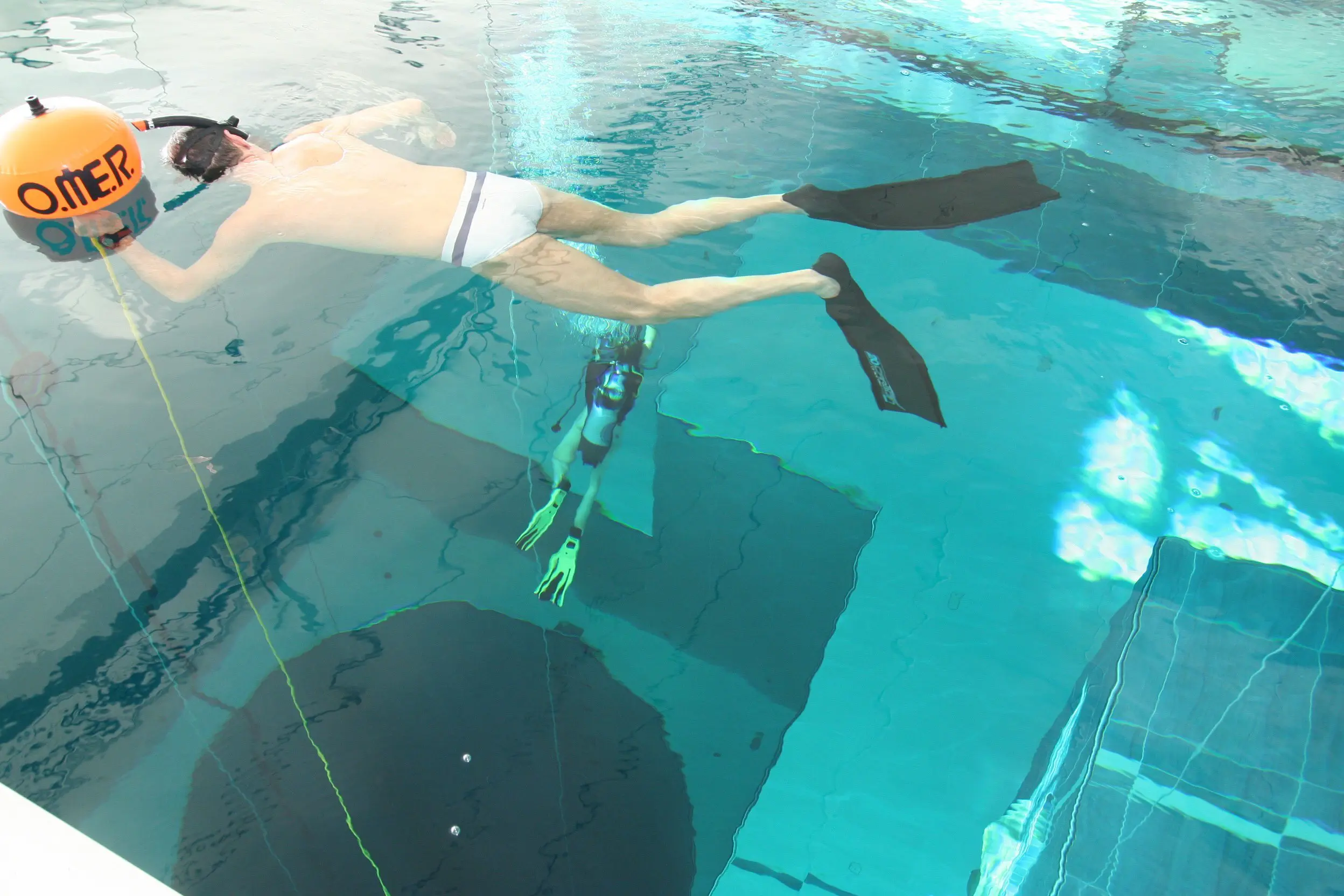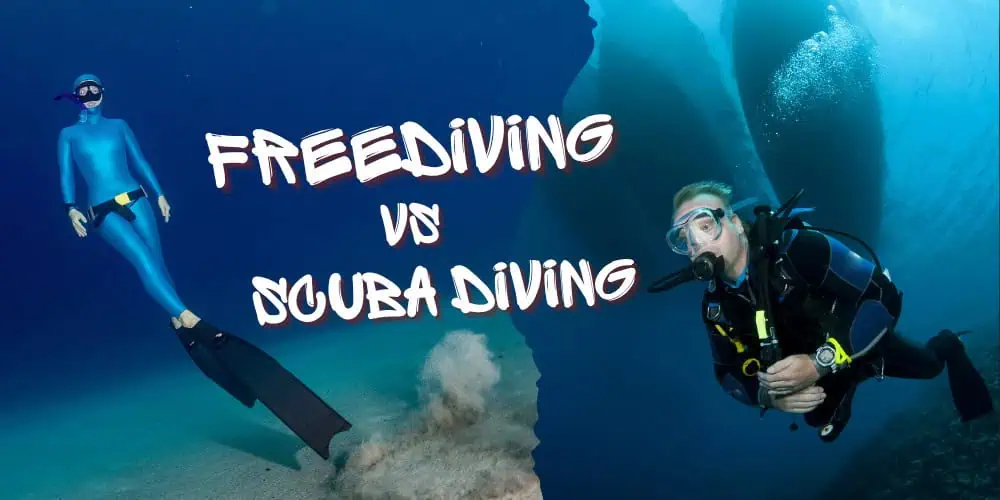Are you wondering between scuba and freediving? If you ask scuba divers, they will swear to you that scuba is the best thing to do in the water. However, if you ask freedivers, they will also swear that freediving is the most fun you can have in a wetsuit.
So, who is right in the Freediving vs. Scuba debate? Is there a winner? And more importantly, which is right for you?

Comparing Freediving and Scuba Diving
While freediving and scuba diving both involve the ocean, they are distinct disciplines. Scuba diving is more about technique and equipment, with physical and mental conditioning playing a relatively minor role, unless you delve into extreme technical diving. On the other hand, with freediving, while technique and equipment are essential, there is a greater emphasis on physical and mental abilities.
Think of it as a sport, if you may. If you start scuba diving at 18, you will improve each year as you gain knowledge and experience. At 65, if you are still healthy and fit, you will be a better scuba diver than when you were 30.
With freediving, the situation is different. Starting at 18, you will ultimately reach your peak in your 20s to 40s, as you are at the peak of your physical powers. However, by the time you are 65, you will be unable to do the same dives in terms of time and depth that you could when you were 35. However, you will still be a much more knowledgeable and experienced free diver, just not as physically able.
Ultimately, when it comes to freediving versus scuba diving, both disciplines are about exploration and the ocean; freediving does have a competitive element, even at the individual level. You want to see if you can go a little deeper or hold your breath a little longer. This does not typically exist in recreational scuba diving, as the limits are well-established and known. You cannot go deeper or stay longer without additional training.
Training and Certification
When it comes to training and certification, fewer training agencies are offering free diving training than scuba certification. While some agencies, such as AIDA, are purely freediving training agencies, others, like PADI, SSI, and RAID, are primarily scuba diving agencies with a freediving program.
As a rule, scuba diving is a more varied field; there is a much broader scope for training. For instance, beyond the basic 3 or 4 levels of training (Open Water, Advanced, Rescue, and Master Diver/Divemaster), a vast variety of specialties is available. These cover almost every aspect of scuba diving, from night diving and navigation to fish identification and boat diving, as well as Nitrox and deep diving.
It doesn’t end there with scuba diving; you can also take the plunge into the technical side and complete a course covering decompression diving, Trimix use, Diver Propulsion Vehicles, and more.
When it comes to freediving, there is much less variety in courses. Most agencies offer only 3 or 4 (typically three) initial levels of freediving courses. You can take a few additional classes, but nowhere near as many as those found in scuba diving. If you enjoy taking many courses and learning, scuba diving, with its wide variety of courses, may be a better option. However, freediving offers a quicker route if you want to focus mainly on doing.
Freediving vs. Scuba: Gear Differences
Without a doubt, when it comes to gear differences and Freediving vs. Scuba Diving, there is significantly more gear and cost involved with scuba diving. Freedivers use a mask, fins, weights, and a wetsuit. However, scuba divers need to use BCDs to control their buoyancy, as well as cylinders that require filling with a compressor, regulators, and other equipment.
Historically, much gear could be used for both, although as freediving has evolved, it has developed its specialized equipment that is not used for scuba diving. For instance, freediving fins are substantially longer than those for scuba diving. Although you could use them to scuba dive, they would be impractical for that purpose.
On the other hand, scuba fins do not generate the same levels of power as freediving fins, as they tend to be much shorter and more flexible, designed for different fining techniques such as frog kicking and helicopter turns.
Also, wetsuits used to be interchangeable, but over time, freediving has evolved its wetsuits to be better suited to the task at hand. Considering the length of the session and the differences between freediving and scuba diving, the two activities are quite distinct.
A typical freediving session is much longer than the average scuba dive. In addition, most of the session is spent on the surface, resting and breathing up before and after dives. Therefore, a freediving suit must keep you warm both on the surface and underwater for longer.
So far, there are gear differences between recreational freedivers and scuba divers. There is even more specialized gear in play when it comes to competitive freediving, such as liquid goggles designed to reduce air space, which need to be equalized while maintaining the ability to see correctly.
Overall, getting fully set up for recreational scuba diving is slightly more expensive than getting set up for recreational free diving, although the difference is not substantial.
Dive Sites and Experiences
Looking at freediving vs. scuba diving sites, you can free dive and scuba dive at any normal dive site worldwide. However, there are some exceptions. If you are chasing depth as a freediver, you need a sheltered site that offers sufficient depth.
That is why two of the most famous freediving sites for training and competition are Dean’s Blue Hole in the Bahamas and the Blue Hole in Dahab. Both are sheltered, with minimal currents, and offer depths over 100m/330ft, making them ideal. Not to mention, they are both relatively close to the shore, making access easy.
A couple of freediving disciplines are practiced in a pool, while there is nothing in scuba diving that is done in a pool. Static and dynamic apnea are virtually exclusively pool-only events, including training and competition.
Scuba diving offers more opportunities and a more comprehensive range of experiences, especially at deeper dive sites, beyond typical freediving abilities. Additionally, exploring wrecks and caves can be done much more safely on scuba.
Tips for Choosing the Right Dive Discipline
So, which is right for you when it comes to freediving versus scuba diving? This question can be tricky and will depend on your goals and objectives. For starters, freediving has a competitive sport element that is not present in scuba diving, which is primarily a hobby. There are no scuba competitions with various disciplines and records.
However, there is a massive sport-freediving scene with competitions, judges, world records, and more. If you want to pursue a sport, freediving may be a better option, as it offers a competitive aspect. Also, many freedivers are involved in spearfishing, so if you want to do spearfishing, your best option is to go the freediving route, since you must be an excellent freediver to be a good spearo.
On the other hand, scuba diving may be a better option if you only want to check out some reefs and marine life while having a nice, chilled-out vacation. It is not as physically demanding as freediving, and you can train relatively quickly to do the kind of dives you want.
If you ask participants, you will be surprised by how much crossover between freedivers and scuba divers. Many ocean lovers practice both and utilize the right tools to explore and enjoy the ocean.
For instance, one day, they may scuba dive on a deeper wreck or reef to explore since both are beyond their freediving abilities. However, the following day, they can free dive with a buddy, exploring a shallow reef with all its wondrous life.
Ultimately, when it comes to freediving vs. scuba diving, if you want to spend time in the ocean and explore, why limit yourself to one discipline only?
The ultimate answer to Freediving vs. Scuba is both!

